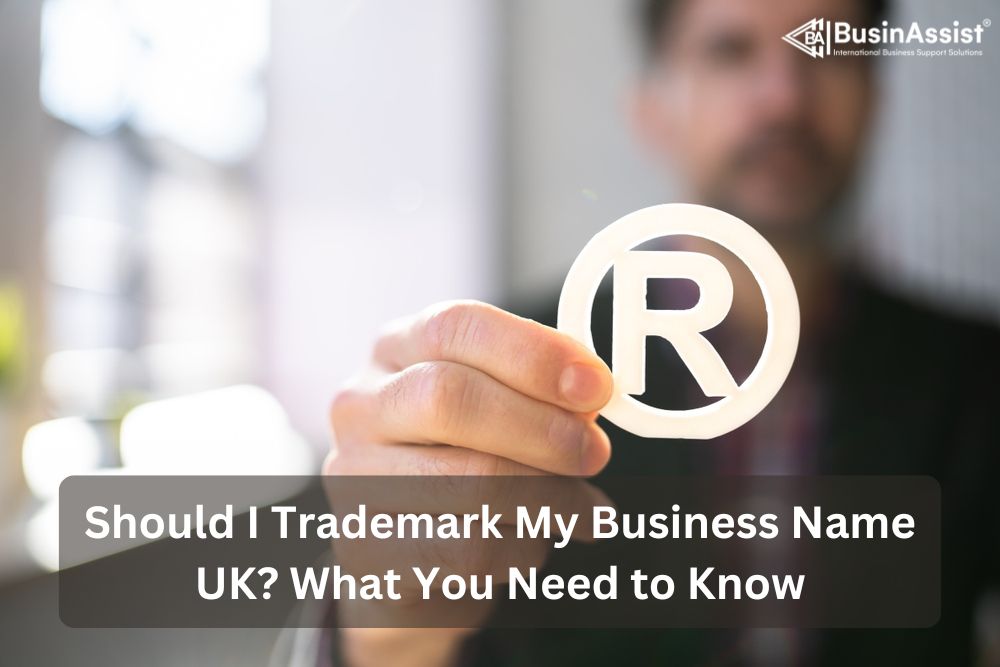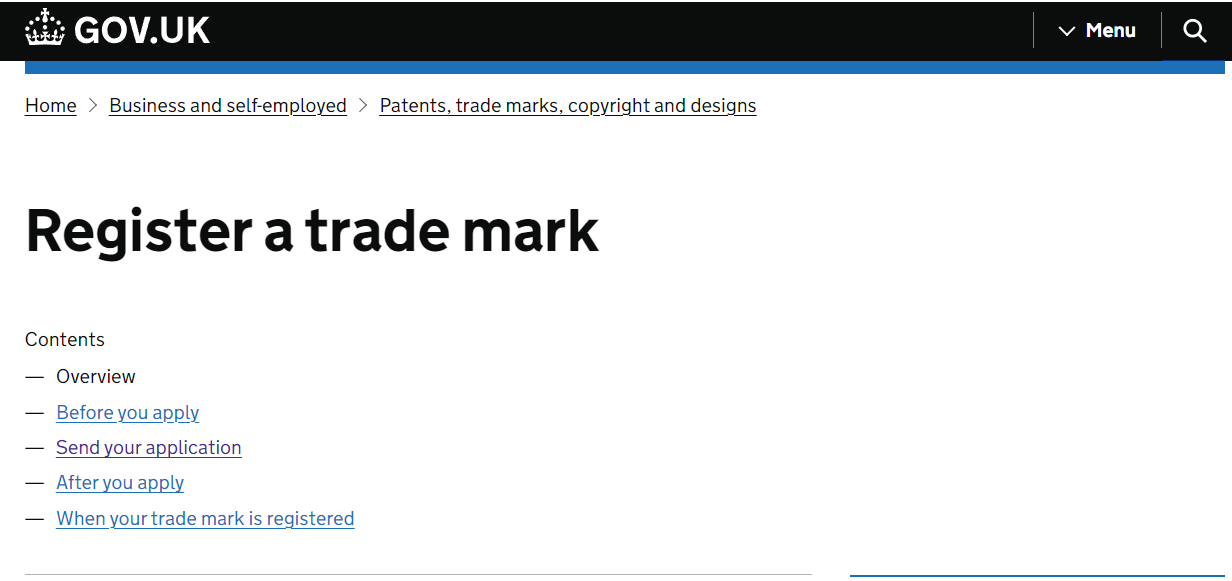Last Updated on December 18, 2025 by Joy Kyalo

Should i trademark my business name UK? It is extremely important to trademark your business name in this fiercely competitive market. Trademark gives your business legal security and exclusivity securing your brand identity. Maintaining your brand identity helps to improve various factors that contribute to the credibility and marketing of a company.
So, why should I trademark my business name in the UK? Though it may seem challenging, this article seeks to explain everything you need about trademarks including their advantages, features, and reasons for protecting businesses’ names in the UK.
What is a trademark?
This is a symbol, design, sign, or expression that identifies with a product, service, or company distinguishing it from others.
Trademark helps in identification since it distinguishes the products and services of your business from others. It also provides legal protection from unauthorised use by other people and businesses enhancing the value of the brand.
Unlike copyright, trademarks must be registered by the UK Intellectual Property Office (UKIPO). They will evaluate whether the mark meets the necessary registration criteria before deciding on its acceptance or rejection for registration.
In the UK, goods and services are categorised into 45 distinct ‘classes’ for trademark registration. When applying for trademark registration, you must identify the class of your business activity.
For instance, if your business deals with cosmetics and cleaning, it falls under class 3; if your business activity is selling musical instruments it will fall under class 15. Therefore, when registering for a trademark, business owners should look into trademark classifications.
A trademark is valid for an initial duration of ten years, with the possibility of indefinite renewal.
There are three types of trademarks which are:
- Design mark: This includes logo, image, or symbols.
- Word mark: Names, phrases, or slogans.
- Combination mark: A combination of symbols and words
Why should one trademark their business name within the UK?

Brand protection: Trademark offers legal protection to your business. This means that no one can use your brand identity or use your mark without permission.
Brand recognition: A trademark will make it easier for people to recognise your business and what it entails and build customer loyalty. It also helps your business stand out in a crowded marketplace.
Prevents imitation and confusion: To protect your business interests from other imitators, you must by all means trademark your products’ names.
Enhances credibility and marketability: A trademark symbol can elevate the credibility of your business. Customers may regard your business as a serious entity attracting potential investors or partners.
Enables legal measures: Upon the infringement of your trademark, having it registered provides you with the legal grounds to initiate proceedings against those who infringe, allowing for the recovery of damages.
Is your brand eligible to be a trademark?
Distinctiveness: To stand out in the market, your brand name must be distinctive and set itself apart from others. Generic or descriptive names are usually not acceptable unless they have become distinctive through prolonged use of the name.
Not deceptive: The name must not mislead anyone regarding the kind of products one is dealing with. Goods or service descriptions should not relate to misleading aspects about these goods/services’ nature, quality, or geographic origin.
In other words, distinctiveness is what you need for a trademark to ensure that there are no similar existing trademarks. Hence doing thorough research is important for a successful registration.
Not offensive: Offensive trademarks have replicated such questioning even as some symbols including national emblems are prohibited such that they cannot be trademarked.
Use in commerce: You must intend to use the trademark in connection with goods or services in the marketplace.
What is the application process for a trademark in the UK?

Do a trademark search: Before submitting your application, it is essential to verify whether your intended trademark is already registered. This can be accomplished by accessing the database of the UK Intellectual Property Office (UKIPO).
Identify the classification: Ascertain the relevant classes of goods or services that your trademark will encompass. The UKIPO employs the Nice Classification system, which categorises items into 45 distinct classes.
Complete the application: Accurately fill out the trademark application form, which can be submitted either online or via postal service. The application will necessitate information regarding your trademark as well as the associated goods or services.
Apply and remit the fee: The standard fee for a single class application is £170, with an additional charge of £50 for each subsequent class.
Examination and publication: The UKIPO will review your application to confirm compliance with all necessary criteria. If no issues arise, your application will be published in the Trade Marks Journal, initiating two months for opposition.
Opposition period: In this phase, third parties have the opportunity to contest your application if they perceive it as conflicting with their registered trademarks.
Registration and renewal: Provided that no oppositions are filed, or if any disputes are settled in your favour, your trademark will be officially registered. It will remain valid for 10 years, after which you may initiate a renewal process.
What are the common mistakes to avoid while registering a trademark?
Insufficient research:
One of the frequent errors in registering a trademark for company’ names is not doing comprehensive research and diligence. Consequently, it may lead to registering a name that has already been used by others forcing one to undertake rebranding as well as facing legal challenges.
Wrong selection of classes:
Another error that must be avoided is selecting the wrong registration categories regarding your trademark or selecting inappropriate product classes, for your trademark, it will not be secured with regards to certain parts thus restricting its protection range.
Choosing a generic or descriptive name:
Names that are too generic or merely describe the product or service are often rejected. Aim for something unique and distinctive.
Incomplete or incorrect application:
Ensure all details in your application are accurate and complete. Mistakes can delay the process or lead to rejection.
Not considering future expansion:
Think about how your business might grow. If you plan to expand into new areas, consider including those classes in your application.
Overlooking international protection:
If you plan to operate internationally, consider applying for trademark protection in other countries as well.
Registering your business name as a trademark in the UK is very important for uniquely preserving your brand and separating your products or services from others in the market industry. It is not only a way of avoiding any possible infringement but also enhances its worth and credibility allowing you to access rights concerning exclusivity and legal defence.
So, why not start now by registering your business name today to have a brand identity that can build your future development path within the UK market? BusinAssist can help you incorporate your UK business to make it a legal entity. We handle all the paperwork and submission processes for registering your company.
We also offer additional services such as a London registered office address and ongoing compliance support which are beneficial for maintaining your brand.
For more information, contact us at info@businAssist.com.
FAQs
Q: How do I trademark a business name?
- To trademark your business name, you will have to:
- Check if the name you want is already trademarked.
- If it’s not trademarked, prepare your application and mention the class of goods and services it will cover.
- Submit your application
- The IPO will examine your application to ensure it meets all requirements.
- If no opposition is raised your trademark will be registered.
Q: Do you need to trademark a business name?
Ans: Trademarking a business name isn’t mandatory, but it can be very beneficial to your company, making you enjoy the monopoly over it.
Q: How to find out if a business name is trademarked?
Ans: To find out if a business name is trademarked, you can use the IPO database which provides online search for trademarked businesses. When you access the database, search for names that closely resemble yours within the same category of goods or services to identify any possible conflicts. Additionally, check various spellings, abbreviations, and alternative forms of your business name.
Q: Can I trademark a business name already in use?
Ans: Yes, it is possible to trademark a business name in use, however, under certain conditions. If the name is in use but not trademarked, you can apply for a trademark and if there are no existing businesses operating in the same industry as yours, you might be able to trademark your chosen name.
To trademark a business name already in use, one has to seek authorisation from the owner of the current Trademark. Secure a consent letter from the Trademark holder that permits your intended use.
Q: Can I trademark a name without a business?
Ans: Yes, you can trademark a name without having a formal business.
Read Also:
- Lost Your Government Gateway User ID and Password? Here’s How to Find Them
- Key Legal Differences Between Executive and Non-Executive Directors
- The Hidden Costs of Being VAT Registered: Is It Killing Your Business?
- How to Trademark a Business Name in the UK: What Every Entrepreneur Should Know
- Everything You Need to Know About Companies House Default Address
- What Are the Disadvantages of a Dormant Company?
- Trade Name Vs. Company Name: What Every Small Business Owner Needs to Know
- Understanding the Timeline: How Long Does It Take to Get a Tax Refund After Self-Assessment?
- What Business to Start in 2025: Top Business Ideas for Future Success

The BusinAssist Editorial Team has 15+ years of experience writing about small business and company formation in the UK, Canada, and the USA. We simplify complex processes and provide practical insights to help entrepreneurs succeed. Business Assist with BusinAssist – your partner for business success.

